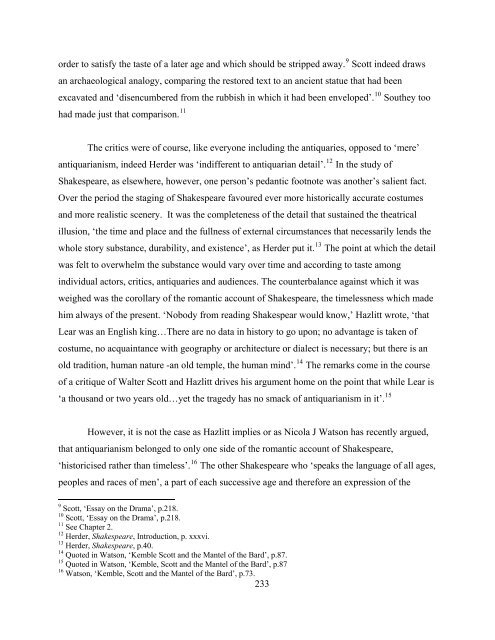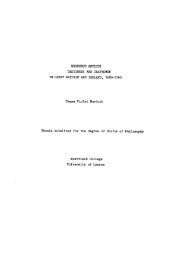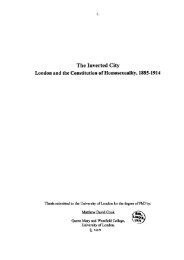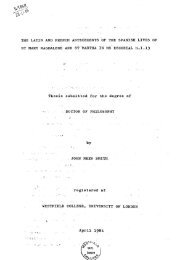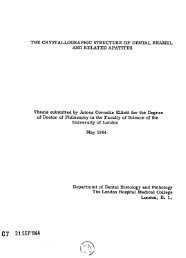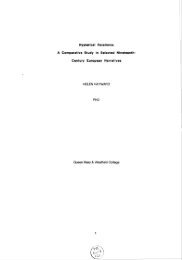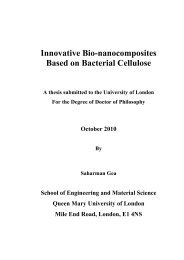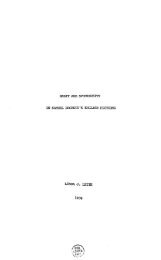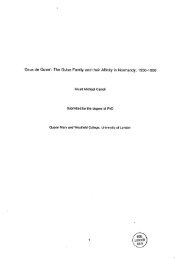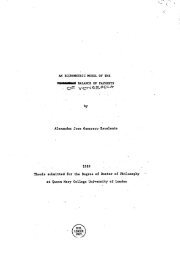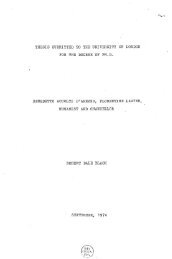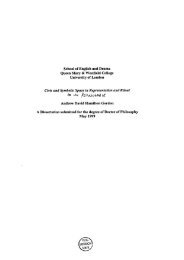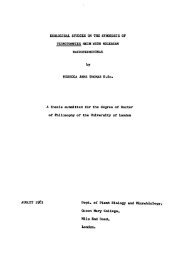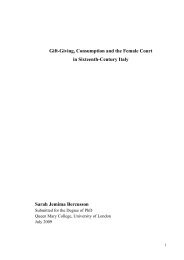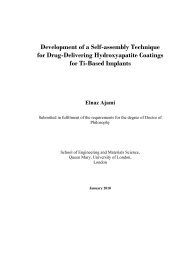Antiquaries in the Age of Romanticism: 1789-1851 - Queen Mary ...
Antiquaries in the Age of Romanticism: 1789-1851 - Queen Mary ...
Antiquaries in the Age of Romanticism: 1789-1851 - Queen Mary ...
You also want an ePaper? Increase the reach of your titles
YUMPU automatically turns print PDFs into web optimized ePapers that Google loves.
order to satisfy <strong>the</strong> taste <strong>of</strong> a later age and which should be stripped away. 9 Scott <strong>in</strong>deed draws<br />
an archaeological analogy, compar<strong>in</strong>g <strong>the</strong> restored text to an ancient statue that had been<br />
excavated and ‘disencumbered from <strong>the</strong> rubbish <strong>in</strong> which it had been enveloped’. 10 Sou<strong>the</strong>y too<br />
had made just that comparison. 11<br />
The critics were <strong>of</strong> course, like everyone <strong>in</strong>clud<strong>in</strong>g <strong>the</strong> antiquaries, opposed to ‘mere’<br />
antiquarianism, <strong>in</strong>deed Herder was ‘<strong>in</strong>different to antiquarian detail’. 12 In <strong>the</strong> study <strong>of</strong><br />
Shakespeare, as elsewhere, however, one person’s pedantic footnote was ano<strong>the</strong>r’s salient fact.<br />
Over <strong>the</strong> period <strong>the</strong> stag<strong>in</strong>g <strong>of</strong> Shakespeare favoured ever more historically accurate costumes<br />
and more realistic scenery. It was <strong>the</strong> completeness <strong>of</strong> <strong>the</strong> detail that susta<strong>in</strong>ed <strong>the</strong> <strong>the</strong>atrical<br />
illusion, ‘<strong>the</strong> time and place and <strong>the</strong> fullness <strong>of</strong> external circumstances that necessarily lends <strong>the</strong><br />
whole story substance, durability, and existence’, as Herder put it. 13 The po<strong>in</strong>t at which <strong>the</strong> detail<br />
was felt to overwhelm <strong>the</strong> substance would vary over time and accord<strong>in</strong>g to taste among<br />
<strong>in</strong>dividual actors, critics, antiquaries and audiences. The counterbalance aga<strong>in</strong>st which it was<br />
weighed was <strong>the</strong> corollary <strong>of</strong> <strong>the</strong> romantic account <strong>of</strong> Shakespeare, <strong>the</strong> timelessness which made<br />
him always <strong>of</strong> <strong>the</strong> present. ‘Nobody from read<strong>in</strong>g Shakespear would know,’ Hazlitt wrote, ‘that<br />
Lear was an English k<strong>in</strong>g…There are no data <strong>in</strong> history to go upon; no advantage is taken <strong>of</strong><br />
costume, no acqua<strong>in</strong>tance with geography or architecture or dialect is necessary; but <strong>the</strong>re is an<br />
old tradition, human nature -an old temple, <strong>the</strong> human m<strong>in</strong>d’. 14 The remarks come <strong>in</strong> <strong>the</strong> course<br />
<strong>of</strong> a critique <strong>of</strong> Walter Scott and Hazlitt drives his argument home on <strong>the</strong> po<strong>in</strong>t that while Lear is<br />
‘a thousand or two years old…yet <strong>the</strong> tragedy has no smack <strong>of</strong> antiquarianism <strong>in</strong> it’. 15<br />
However, it is not <strong>the</strong> case as Hazlitt implies or as Nicola J Watson has recently argued,<br />
that antiquarianism belonged to only one side <strong>of</strong> <strong>the</strong> romantic account <strong>of</strong> Shakespeare,<br />
‘historicised ra<strong>the</strong>r than timeless’. 16 The o<strong>the</strong>r Shakespeare who ‘speaks <strong>the</strong> language <strong>of</strong> all ages,<br />
peoples and races <strong>of</strong> men’, a part <strong>of</strong> each successive age and <strong>the</strong>refore an expression <strong>of</strong> <strong>the</strong><br />
9<br />
Scott, ‘Essay on <strong>the</strong> Drama’, p.218.<br />
10<br />
Scott, ‘Essay on <strong>the</strong> Drama’, p.218.<br />
11<br />
See Chapter 2.<br />
12<br />
Herder, Shakespeare, Introduction, p. xxxvi.<br />
13<br />
Herder, Shakespeare, p.40.<br />
14<br />
Quoted <strong>in</strong> Watson, ‘Kemble Scott and <strong>the</strong> Mantel <strong>of</strong> <strong>the</strong> Bard’, p.87.<br />
15<br />
Quoted <strong>in</strong> Watson, ‘Kemble, Scott and <strong>the</strong> Mantel <strong>of</strong> <strong>the</strong> Bard’, p.87<br />
16<br />
Watson, ‘Kemble, Scott and <strong>the</strong> Mantel <strong>of</strong> <strong>the</strong> Bard’, p.73.<br />
233


